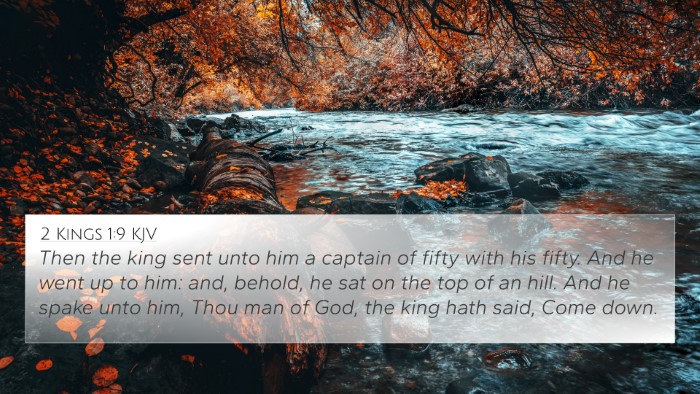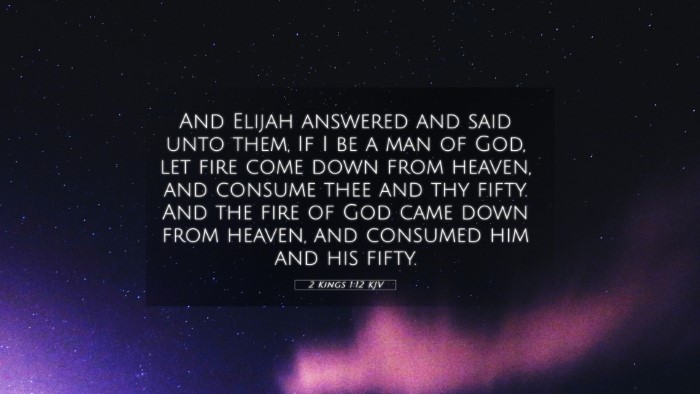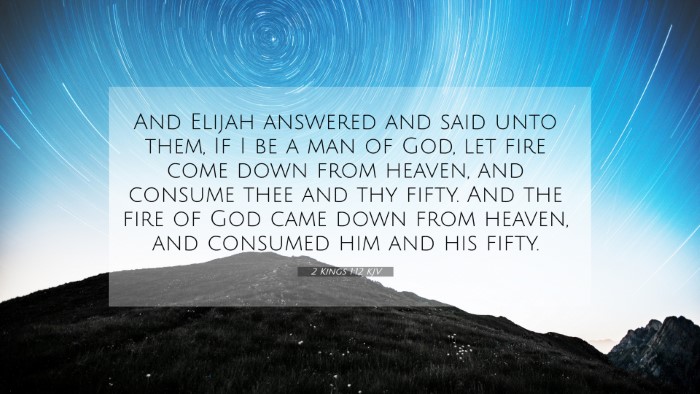Old Testament
Genesis Exodus Leviticus Numbers Deuteronomy Joshua Judges Ruth 1 Samuel 2 Samuel 1 Kings 2 Kings 1 Chronicles 2 Chronicles Ezra Nehemiah Esther Job Psalms Proverbs Ecclesiastes Song of Solomon Isaiah Jeremiah Lamentations Ezekiel Daniel Hosea Joel Amos Obadiah Jonah Micah Nahum Habakkuk Zephaniah Haggai Zechariah Malachi2 Kings 1:12 Similar Verses
2 Kings 1:12 Cross References
And Elijah answered and said unto them, If I be a man of God, let fire come down from heaven, and consume thee and thy fifty. And the fire of God came down from heaven, and consumed him and his fifty.
Uncover the Rich Themes and Topics of This Bible Verse
Listed below are the Bible themes associated with 2 Kings 1:12. We invite you to explore each theme to gain deeper insights into the Scriptures.
2 Kings 1:12 Cross Reference Verses
This section features a detailed cross-reference designed to enrich your understanding of the Scriptures. Below, you will find carefully selected verses that echo the themes and teachings related to 2 Kings 1:12 KJV. Click on any image to explore detailed analyses of related Bible verses and uncover deeper theological insights.

2 Kings 1:9 (KJV) »
Then the king sent unto him a captain of fifty with his fifty. And he went up to him: and, behold, he sat on the top of an hill. And he spake unto him, Thou man of God, the king hath said, Come down.
2 Kings 1:12 Verse Analysis and Similar Verses
Bible Verse: 2 Kings 1:12
Verse Text: "But Elijah answered and said to them, 'If I am a man of God, let fire come down from heaven and consume you and your fifty.' And the fire of God came down from heaven and consumed him and his fifty."
Summary of 2 Kings 1:12 Meaning
This verse illustrates the authority of the prophet Elijah as a servant of God, showcasing the power of divine judgment. In the context of this scriptural account, the king of Israel sends a captain with soldiers to confront Elijah, who had pronounced God's judgment upon the nation. The response of Elijah to the captain reflects his conviction and confidence in God's sovereignty.
Insights from Commentaries
Matthew Henry: Henry observes that this episode demonstrates God's supremacy over human authority. The fire from heaven is a direct testimony of God's power to intervene in human affairs when confronted with defiance against His prophet. This incident serves as a reminder of the seriousness of disobedience to God's word and the consequences that follow.
Albert Barnes: Barnes emphasizes the miraculous nature of God's response and the validation of Elijah's role as a true prophet. Fire coming down signifies God's judgment and showcases His ability to protect His messengers. The event underlines the necessity of recognizing true divine authority.
Adam Clarke: Clarke elaborates on the nature of Elijah’s prophetic authority and God's prompt response. He mentions how the captain's approach was irreverent, and Elijah’s declaration was a stark reminder of God’s might. Clarke draws attention to the act of fire as both a punishment and a demonstration of divine control in the face of hostility.
Cross References
- 1 Kings 18:38 - The fire from heaven at Mount Carmel during the confrontation with the prophets of Baal.
- 2 Kings 1:10 - Elijah's previous confrontation with a captain, where he commands fire from heaven.
- Luke 9:54 - Jesus’s response to the disciples who wanted fire to come down, relating to Elijah's actions and authority.
- James 5:17-18 - Discusses Elijah's prayer and the power it held, emphasizing his role as a prophet.
- 2 Chronicles 24:20 - The Spirit of God coming upon Zechariah, showing the theme of divine sending and authority.
- Malachi 4:5 - A prophetic reference to Elijah's return, presenting him as a precursor to the coming judgment.
- Hebrews 12:29 - Highlights that our God is a consuming fire, echoing the nature of God's judgment in Elijah's time.
Thematic Connections
The themes present in 2 Kings 1:12 connect to broader biblical concepts of judgment, divine authority, and prophecy. The following biblical themes are illustrated:
- Divine Judgment: The consuming fire symbolizes judgment against those who oppose God.
- Authority of Prophets: Elijah’s position emphasizes the role of God's messengers in conveying His will.
- Faith and Conviction: Elijah’s unwavering faith in God’s protection highlights the believer's trust in God's power.
- Reverence and Fear of God: The response to Elijah’s declaration exemplifies the necessity of respecting God's commands and emissaries.
Conclusion
2 Kings 1:12 serves as a powerful testament to God's ability to intervene in response to disobedience and challenge. The cross-references affirm the interconnectedness of scripture, illustrating how God's messages through different prophets align in theme and purpose. Understanding these connections enhances our interpretive study of the Bible.
Additional Resources for Cross-Referencing
- Bible Concordance: A tool to find related verses and themes.
- Bible Cross-Reference Guide: Assists in discovering links between different scriptures.
- Cross-Reference Bible Study: Methods for integrating verses into cohesive study.
- Bible Reference Resources: Materials for deeper scriptural analysis and connections.
- Comprehensive Bible Cross-Reference Materials: Various works aimed at enhancing understanding of biblical texts.
Exploring Connections
When studying individual verses like 2 Kings 1:12, consider employing tools that facilitate cross-referencing. Use methods such as thematic categorizations and scriptural parallels to uncover deeper meanings and relationships within biblical texts. This approach enriches the Bible study experience and fosters a greater understanding of God's word.


